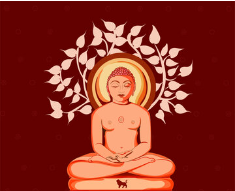Are Jains Atheists

There is a good deal of controversy as to whether Jainism is atheistic or not. Shankaracharya and following him, many European orientalists answer the question in the affirmative. But to call the jains atheistic is a misunderstanding. According to their view, the Karma and the universe are unbegun, indestructible and everexisting.
Whatever we do, i.e our karma is sure to produce its results on us. God will not interfere to undo these effects even if we prayed to the utmost. That God is omniscient perpetually living and auspicious in nature, is admitted by denied by them. The Laws of Karma is universally true.
The soul of man elevates itself by the path of the three jewels, i.e ., True Faith, Knowledge and Conduct and after attaining Nirvana or Moksha (i.e. freedom from all bondage of passions) it becomes divine. The God is not the creator, protector and destroyer of the universe. He is only the most perfect soul.
So they believe in God but differ as to his work. On this difference, they are charged with atheism. If so shri Krishna who, in his DIVINE LAY says: “The Lord does neither create the actor nor the actions of the world, nor does He determine what actions shall bear what fruits.
This is all natural Nor does He take anyone’s merits or sins. When ignorance throws a veil on wisdom, People go astry”- surely, the Divine singer of these lines must be called an atheist. So the way to consider this problem is to accept the meaning of an atheist as given by Panini who defines a Nastika as “one who does not accept the truth of after-death existence” of the soul. The Jains who believe in the Swargas or heavens & the hells are to be considered as perfectly theistic.
The Digambars and the Shwetambars differ as to the number of heavens but there is no doubt that there are other worlds besides this which the soul has to pass the absolute authority of the Vedas, the Jains in company with the Moslems, the Christians and the Brahmos will have no doubt to be styled as atheists ! In fact, the Jains can under no circumstances be called Nastiks (in a derogatory sense).

Hence uncertainty in knowledge is a self-contradictory position, according to our theory. There was very keen controversy and an amount of hair-splitting over the attempt of our school to reconcile existence and non-existence as residing in one thing. The answer to such criticism is that antagonism is only relative in the universe.
But as “we are immersed in the conflict and occupied with our adversary, we cannot at the same moment rise to the consciousness of that power which is working in him and in us alike.” As Hegel would put it, being and non-being are identical. The Adwait and the Prithaktva of objects, idealism and realism, universals and particulars, unity and difference, subject and object, these are relatively opposite to each other ; but they are not parallels to run into eternity without for a moment converging towards each other. The absolute parallel is a fiction in true philosophy.
It is only our narrowness of view that our horizon closes with a widening gulf. But this is forgetting the very ground of all opposition, the ground which makes the absoluteness of every opposition unthinkable and without which opposition would have nothing to stand on. This is to stop with half the truth; for it is ignoring the integrating force in all nature which includes and transcends differentiation.



